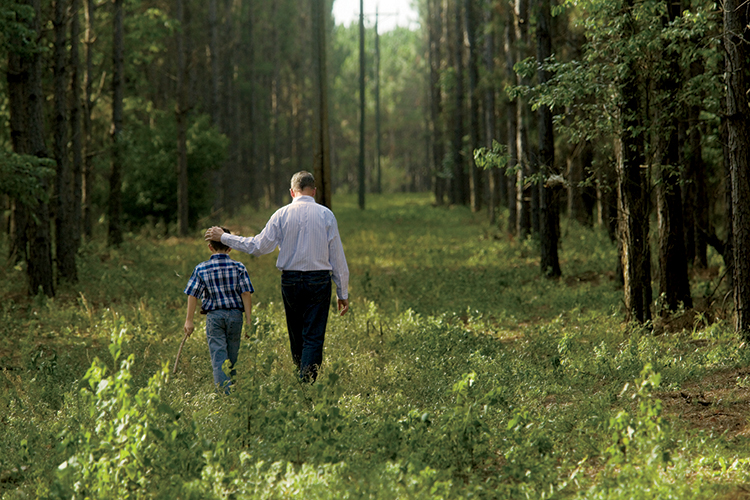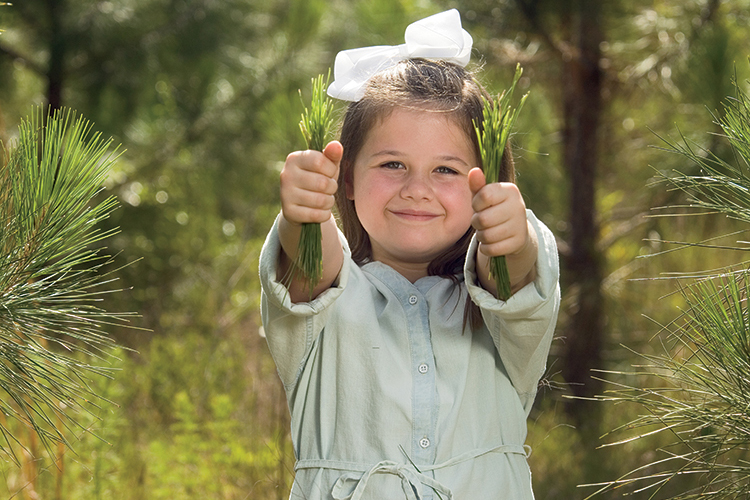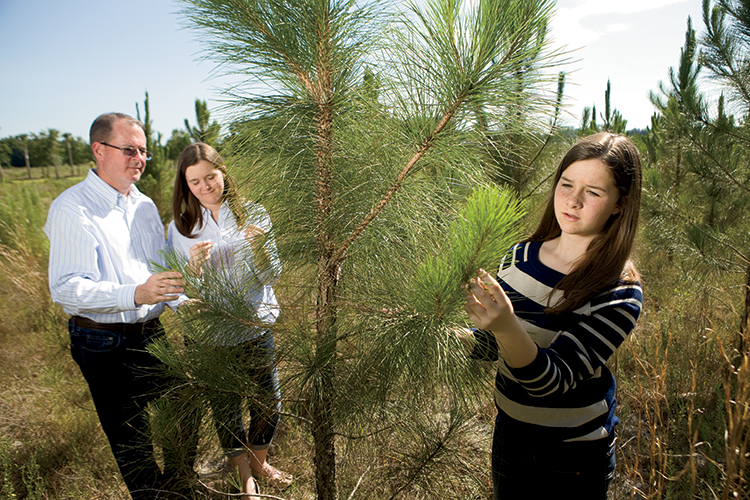Home > Florida > Florida Farm to Table > Get to Know A Florida Farm Family
Get to Know A Florida Farm Family
In partnership with: Florida Department of Agriculture and Consumer Services

Lafayette County Judge Darren Jackson and his wife, Heather, an interior designer, have never been afraid of hard work. The couple and their four children – Grace (15), Audrey (13), Bishop (9) and Eva LeNore (8) manage approximately 400 acres of timber on the Mayo farm that has been in Darren’s family since 1904.
Darren’s mother was raised on the farm along the Suwannee River that his own family now calls home. For decades, the land produced row crops, tobacco and cattle before it was used for timber, a crop that is harvested about every 18 years.
“I grew up on a farm two miles from here that was owned by my dad’s side of the family, so I was surrounded by tobacco and corn in my childhood,” Darren Jackson says. “I always wanted to grow up and work in an office, and now I do. But it’s very satisfying to get back to the peaceful environment of the farm and to know that I’m going to leave something for future generations.”

The Business Of Timber
While many farmers plant row crops, the Jacksons plant pine trees, which are eventually harvested for pulpwood (a precursor to paper) or to be made into two-by-fours at a regional sawmill. Since 18 years is a long time to wait for a return on their investment, the Jacksons have figured out a way to make money in the meantime by selling the pin needles that fall from the trees.
“At around eight or nine years old, the pine trees start losing needles, so people will come in and bale the pine needles to be used as bedding for shrubbery as an alternative to mulch,” Jackson explains. “There’s a big market for pine straw in this area. One benefit is that pine needles are rot-resistant. Pine straw used to just sit on the ground, but over the last 40 years, it has become a repeatable, dependable source of income on a yearly basis.”
Unlike her husband, Heather was raised in the city, so she has come to appreciate the value of a family farm. While Darren works as a county judge, she works on the farm, mowing, watering and soil testing. She also raises free-range chickens so the family always has fresh eggs to eat.
The couple’s children raise three or four hogs each year that they show in 4-H, and the kids are also active in FFA. Raising their own hogs means they have access to fresh pork produced right on their farm. The Jacksons also grow plums, grapes, olives and blackberries for their own consumption.
“I try to give our kids smart food choices and teach them to pay attention to what we put in our bodies,” Heather Jackson says. “I was not raised on a farm like Darren, so I enjoy the seclusion and I love being on a tractor out in nature. Our kids can roam and run free. You look at life differently on a farm.”

Century Pioneer Family Farm Program
The Jacksons aren’t the only Florida farmers who have been farming for multiple generations. In 1985, the Florida Department of Agriculture and Consumer Services implemented the Century Pioneer Family Farm Program, which recognizes and honors families who have maintained at least 100 years of continuous family farm ownership. Currently, there are 248 farms recognized by the program.
“This important program helps showcase the rich agriculture heritage and agriculture families we have here in our great state,” says Cheryl Flood, External Affairs Director. “This program highlights these pioneers as the original stewards of the land for preserving environmental resources and helping foster Florida’s agricultural industry from one generation to the next.”
Jackson says one of the first lessons he learned as a child was that land is very important.
“My grandpa always said, ‘God’s not making any more land,’” he recalls. “In many urban areas today, people get their food at the supermarket and never set foot on a farm. What they know about farming is limited to what they see on TV – and that may be large companies being sued or agriculture getting a bad name.”
What Jackson hopes to help consumers understand is that the majority of American farms – about 96 percent – are still family-owned.
“Many people don’t realize most American farms are still run by small mom-and-pop farmers,” he says. “People don’t see that on the news. As farmers, we understand that the land we take care of now, we leave to our children.”
Their son, Bishop, is already showing interest in farming. “He loves the land,” Jackson says. “I hope timber is still a viable option for my children in the future. If they want to do some cattle farming, that’s an option for them, too. We hope our children can one day sustain themselves on the farm and be happy and productive here.”



